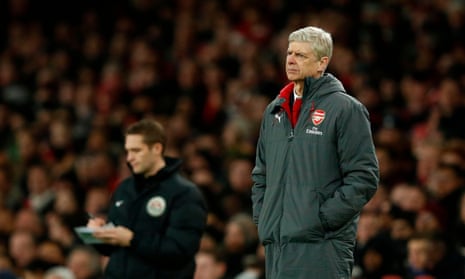There was a classic Arsène Wenger moment on Wednesday as he walked towards the exit door of the media auditorium at the Emirates Stadium. It was put to the Arsenal manager that Jack Wilshere might have been sent off for a second bookable offence during the helter-skelter 2-2 draw with Chelsea – a dive following a challenge from Andreas Christensen.
“That would have made you happy,” Wenger countered.
“Seriously, Arsène,” the journalist said. “What did you make of it? Did you see the incident?”
“Honestly, no,” Wenger replied, before taking his leave.
Wenger had a clear view of what he wanted to see, which was the decision of the Anthony Taylor to award a penalty against Héctor Bellerín for catching Eden Hazard. The Chelsea forward would convert the kick for 1-1, which was the signal for Arsenal, in Wenger’s words, to feel “mentally shot” and concede again to Marcos Alonso. Bellerín would bail them out with a stoppage-time equaliser.
Wenger also saw something deeper and more sinister – the latest evidence that Arsenal are persecuted by officials. He had run through the charge sheet on Tuesday, taking in the bad decisions his team suffered at Stoke City, Watford and Manchester City before the coup de grace – the last-minute penalty award for West Bromwich Albion at The Hawthorns on Sunday, which in effect cost Arsenal two points. They are five points behind the teams in Champions League places.
That one was a shocker from Mike Dean, with even the Albion manager, Alan Pardew, admitting he “would have been very upset if it was given against me”. The Arsenal defender Calum Chambers simply could not get his hand out of the way after Kieran Gibbs had hit the ball at it from close range.
Wenger faces a touchline or stadium ban for his furious post-match confrontation with Dean in the referees’ room, while the Football Association have asked him to explain some of his juiciest media comments. They include the line from Tuesday about how Dean “saw what he wanted to see” when giving the penalty – in other words, he wanted to see the penalty, even though it was not there.
That is a serious accusation but Wenger matched it after the Chelsea game when he suggested he knew his team would be on the wrong end of a bad decision – or, to use his word, a “farcical” one. Never mind that, on this occasion, Taylor’s call was correct. Bellerín clearly kicked Hazard’s foot.
“We got again a farcical decision on a penalty, but we knew that as well before,” Wenger said. “So we have to deal with that.” In another post-match interview, with the BBC, Wenger said: “Once again, we got a very bad decision against us. We have to account in our preparations for that’s what we have to face.”
Wenger has until 6pm on Tuesday to give his observations. The FA could bring further charges against him.
The accusation of some kind of premeditated campaign by referees against Arsenal is ludicrous but Wenger is in one of those moods where he sees conspiracy at every turn. Post-Chelsea, he was calm enough on the surface, which is not always the case, but he was inconsistent.
In one breath, he attacked a refereeing decision in the strongest possible terms and, in the next, he sought the moral high ground, insisting that all he wanted to do was talk about the football, which had been thrilling.
In Wenger’s ideal world, the media would shine a light on poor refereeing decisions, meaning the managers would not have to do so. But he clearly feels that we need a little help. He wanted to know why certain decisions in Tottenham Hotspur’s 2-0 win at Swansea City on Tuesday night were not attacked by the newspapers – principally, Fernando Llorente’s offside opener and how Davinson Sánchez avoided a possible second yellow card.
Wenger cannot make such demands in the forum of a press conference without personally bringing up the issues that he professes to be above. It is probably worth mentioning that Wenger does not generally go off the record.
Wenger tied himself in several knots, although he did not seem to realise it. Was the answer for all managers not simply to accept the decisions of referees? “That’s what I do, I have no choice,” Wenger began. There was a but coming. “But you have to say as well, at the moment, we have to face surprising decisions.”
Like so many top managers, Wenger’s vision is selective. Obviously, he has not mentioned the decisions that have gone for Arsenal in this season’s Premier League, such as the penalty Albion did not get at the Emirates or the soft one his team got at Burnley. Or how Shkodran Mustafi was marginally offside when he scored against Tottenham.
Wenger said he stood by every word he said about the penalty at The Hawthorns and he will not back down. But where does it end? With more FA charges? It is one thing to moan about the media and question their motives but quite another to do so with the referees. Moreover, if Wenger is preparing his team to expect bad decisions in matches, what does that say about their mindset? Paranoia can chip away at conviction. This is a battle Wenger cannot win. He needs to see it for what it is – a distraction and a drain.

